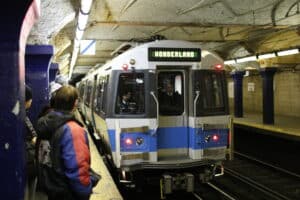
An MBTA Blue Line train pulls into the State Street station. Photo by Derek Yu | Flickr / CC BY-SA 2.0
House and Senate leaders reached an agreement Thursday to keep the MBTA’s Fiscal and Management Control Board in place for another year.
After weeks of disagreement between the two branches, the Senate adopted what one top lawmaker called a “compromise” that will extend the about-to-expire board tasked with overseeing and managing the T until June 30, 2021.
Settling on a $200 million allocation toward road repairs represents a retreat from the $300 million that both the House and Senate had already approved in earlier legislation, reducing the funding level to where it has remained almost every single year for the past decade.
The compromise reached Thursday also stabilizes uncertainty surrounding the future of MBTA oversight, at least for another year.
The FMCB, which since its formation in 2015 has conducted dozens of public meetings every year to discuss and approve T budgets and projects, will expire on June 30 under current state law.
Without legislative agreement to extend or replace the board, control would revert to the Department of Transportation Board of Directors on July 1.
Lawmakers at first took different positions on how to handle the board. As part of its March tax bill, the House approved extending the FMCB another three to five years and adding seats for the city of Boston and another municipality in the T’s service area.
A Senate bill approved this month would have created a brand-new, seven-seat MBTA Board of Directors with the state transportation secretary and someone appointed by the MBTA Advisory Board watchdog group serving as members.
“We will have to continue to work on that,” Transportation Committee Co-chair Sen. Joseph Boncore said. “I am committed to seeing through and working out a compromise between the House and Senate over the next year because that extension will expire on June 30, 2021.”
The new bill does not add any seats to the FMCB, but keeps it in place one additional year. It will still need to earn Gov. Charlie Baker’s approval before the board is extended, and Baker previously recommended a seven-member new board similar to the Senate’s original proposal.
Part of the bill also included a deal on a proposed increase in road and bridge maintenance funding, effectively sealing the fate of the annual reimbursement program.
Gov. Charlie Baker originally proposed funding the Chapter 90 program at $200 million next year. In March, the House bumped the amount up to $300 million as part of its version of Baker’s multi-year $18 billion transportation bond bill. The Senate did not act on the matter until June, when it also approved $300 million in a separate bill.
However, House leaders began to cast doubt over the state’s ability to afford the additional bonding amid a pandemic-fueled recession without a package of tax and fee hikes they approved – hikes that the Senate has left untouched for months. House leaders appeared to be prodding the Senate to join them in passing a major tax package that could fund a wider array of road and mass transit projects business groups say are critical to the state’s economic future, and it’s unclear whether the Senate’s retreat on Chapter 90 funding means that branch has given up on tax-raising initiatives to fund transportation this year.




 |
| 

